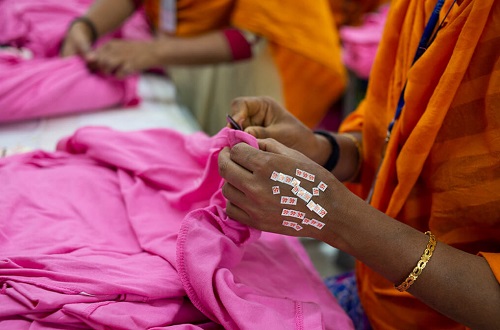 The closing of stores and cancelling of orders across the globe is prompting retailers to cancel orders, leaving factories in countries like Bangladesh, Vietnam, India with inventory worth of millions of dollars. Though brands like H&M, Target, Zara parent Inditex, The North Face parent VF Corp, Tommy Hilfiger parent PVH Corp and French label Kiabi have announced they would pay, as per regular terms, for all orders already produced or in production.
The closing of stores and cancelling of orders across the globe is prompting retailers to cancel orders, leaving factories in countries like Bangladesh, Vietnam, India with inventory worth of millions of dollars. Though brands like H&M, Target, Zara parent Inditex, The North Face parent VF Corp, Tommy Hilfiger parent PVH Corp and French label Kiabi have announced they would pay, as per regular terms, for all orders already produced or in production.
However, according to Vogue Business, the reality for suppliers is more complicated than just their orders being cancelled. Typical contractual agreements leave suppliers vulnerable, as brands don’t pay for orders until they’re shipped, and they decide when product will be shipped.
With Covid-19 causing mass disruptions, the already fragile retail supply chain is buckling. Though some brands are taking orders, they are asking for discounts or rebates from suppliers. Some retailers are cancelling future orders, which can prove costly for suppliers who have made plans based on brands’ projections, including having turned away other orders. Meanwhile some brands are not cancelling orders, but they are not accepting them either. This is forcing suppliers to store these goods and wait to be paid.
Order cancelation common phenomenon
Though some brands like H&M and Inditex have taken their orders on time, other brands have not done so. European fast fashion retailer C&A in late March cancelled all orders till June, including some goods that are ready to ship and others in various stages of production. Similarly, Denmark-based Bestseller cancelled all orders in mid-March while asking for a discount on orders that were shipped since late January.
March cancelled all orders till June, including some goods that are ready to ship and others in various stages of production. Similarly, Denmark-based Bestseller cancelled all orders in mid-March while asking for a discount on orders that were shipped since late January.
Recent Bangladesh Garment Manufacturers and Exporters Association stats show, $1.5 billion worth of garment orders have been cancelled across 1,100 suppliers in Bangladesh, while $2 billion have been put on hold. Deferment and cancellations of both existing and future orders are common throughout the country’s garment manufacturing sector.
Cancelled orders have become a great cause of concern for suppliers in Bangladesh and other manufacturing countries. They are urging brands to extend their sense of responsibility to their full supply chains.
According to Sharif Zahir, Managing Director, Ananta Group, cancelled orders pose the biggest threat to suppliers; he has to pay for all the expenses involved in products that have already been made. He estimates 40 per cent of his March orders have been held back, and a smaller percentage cancelled entirely.
Being responsible for the entire supply chain
To deal with this, Kalpona Akter, Executive Director of the Bangladesh Center for Worker Solidarity, urges suppliers to change their contract terms. She says factories should be paid once they complete an order, whether or not it can be shipped. They should also set up a relief fund to help workers in manufacturing countries grapple with the crisis. Zahir says though brands have focused on improving welfare since Rana Plaza, they now need to be responsible for their entire supply chain. These brands need to look for easier access to liquidity that the government now provides them.
Scott Nova, Executive Director, Worker Rights Consortium, wants to see more brands step up the way H&M and the five other brands have. He feels, this will have significant impact on the health and livelihoods of millions of workers in Bangladesh, and all countries that fashion relies on to produce its goods. Brands and retailers can either choose to act responsibly, or use their leverage to push all the pain down the supply chain. Their choice of action will have a lot of implications for people around the world.












